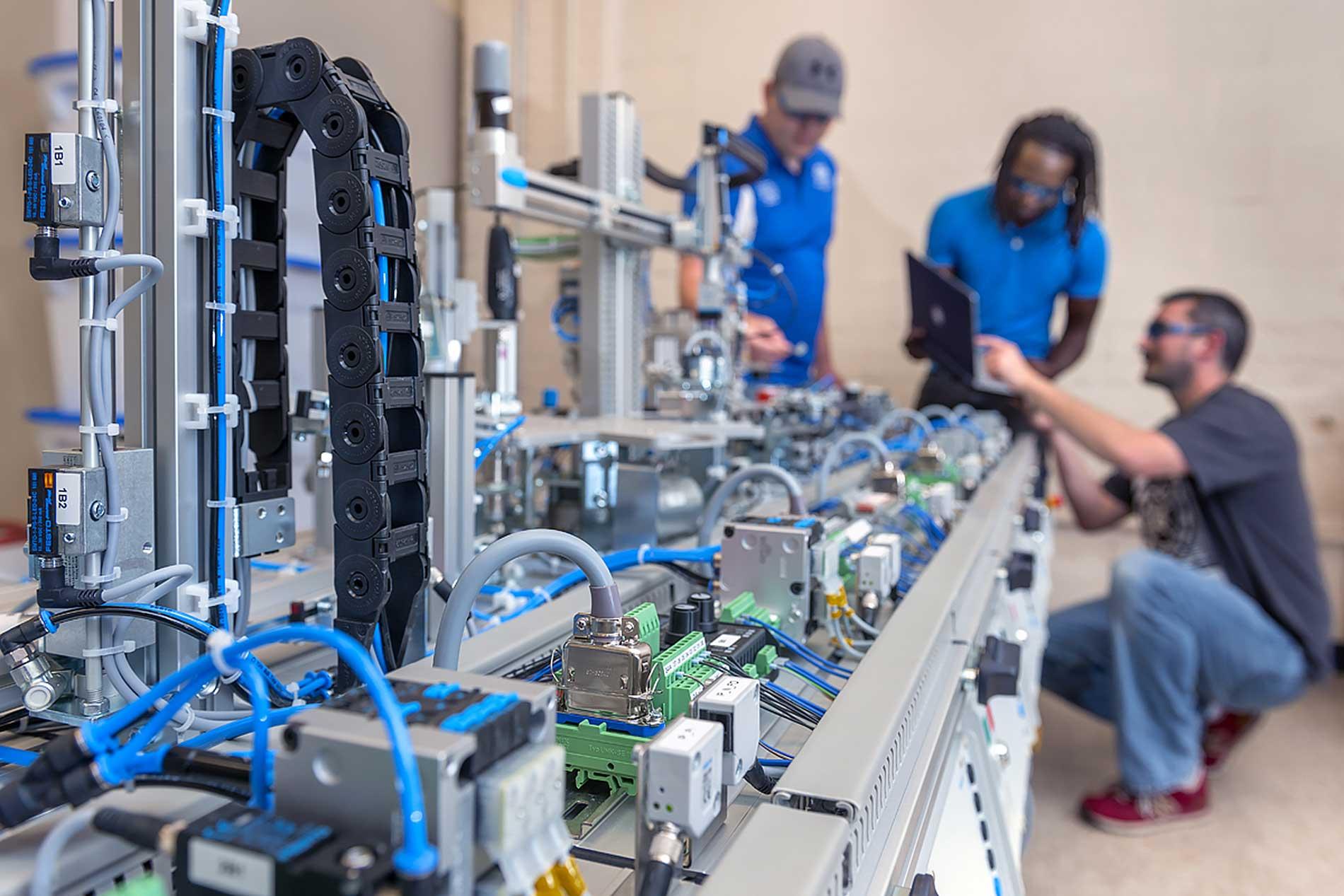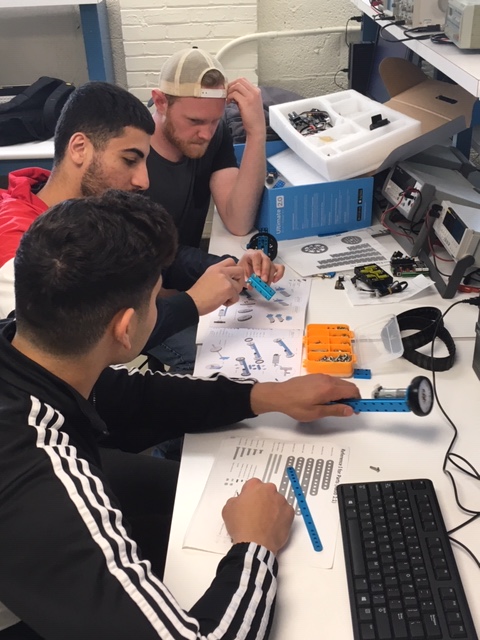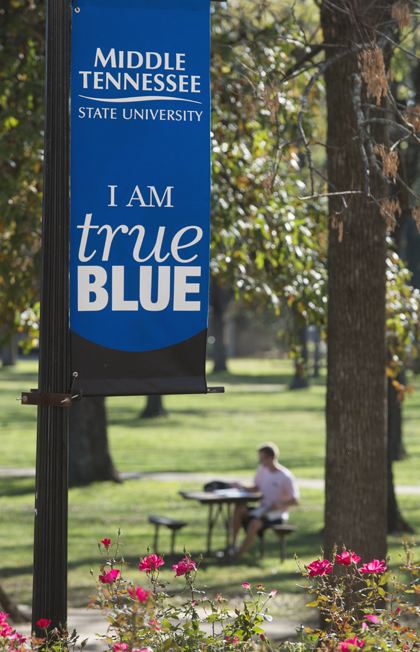
Mechatronics Engineering
Prepare for automation and robotics careers by blending mechanical, electronic, and programming skill sets.
Mechatronics Engineering, B.S.
WHAT IS MECHATRONICS?
The Mechatronics Engineering degree encompasses knowledge and skills in mechanical engineering, electronics engineering, digital controls, computer programming, and project management to enable students to analyze and design automation and robotics systems used in today's advanced manufacturing environment.
This program emphasizes the latest techniques in systems approach in design and problem-solving which is highly supported by today's industry.
The Mechatronics Engineering program is designed to prepare students for engineering positions as automation system designers and project managers in various industries such as automotive, aerospace, advanced manufacturing, green energy, biotechnology, healthcare, homeland security and defense, and transportation and logistics.
HIGHLIGHTS
- Degree certified by the Engineering Accreditation Commission of ABET Change to: The Mechatronics Engineering program is accredited by the Engineering Accreditation Commission of ABET (hyperlink on ABET https://www.abet.org/), under the General Criteria.
- Extensive experience in advanced lab methodologies
- Graduates recruited by regional, national, and international employers
If you live in one of these states: AL SC; you may be able to attend MTSU at in-state rates under the Academic Common Market program.
News Briefs

New Robotics Course Introduces Students to Automation
"If you want to learn about how math is applied to our generation, this class will be a trailer of the real world," declares Sangmin Kim, senior. In a newly developed robotics course, engineering students learn both theory and applications of robotics in preparation for industrial employment. Although rigorous, the course is popular with students due to its entertainment and practicality: "Very interesting yet extremely challenging," according to senior Douglas Potter. During the lecture, students learn the mathematics governing robot motion, including forward and inverse kinematics, singularities, and control. The lab portion involves building and programming robots and also incorporates field trips to introduce students to industrial automation in action.
News Briefs
New Robotics Course Introduces Students to Automation

"If you want to learn about how math is applied to our generation, this class will be a trailer of the real world," declares Sangmin Kim, senior. In a newly developed robotics course, engineering students learn both theory and applications of robotics in preparation for industrial employment. Although rigorous, the course is popular with students due to its entertainment and practicality: "Very interesting yet extremely challenging," according to senior Douglas Potter. During the lecture, students learn the mathematics governing robot motion, including forward and inverse kinematics, singularities, and control. The lab portion involves building and programming robots and also incorporates field trips to introduce students to industrial automation in action.
Related Media

Current Job Titles of Mechatronics Engineering alumni
MTSU’s Mechatronics Engineering degree program is on the cutting edge of a fast-growing industry. Jobs are waiting for engineers to design and enhance robotics and automated systems. The design process of mechatronics combines mechanical, computer, and electrical engineering along with systems integration and technical project management. Unlike traditional programs, MTSU’s mechatronics has a systems approach, breaking the whole down into subsystems and then components, so that graduates can design products with a system in mind, not just one component. Automotive industry giants like Bridgestone, Nissan, and GM are hiring our graduates. Also, automation integrators such as Automation Nth, Spring Automation, and Fives International are interested in Mechatronics Engineering graduates. Finally, there is a large demand in logistics, distribution, and reverse logistics companies such as Assurant, FedEx, and Amazon that are actively recruiting at MTSU.
Our graduates arecommonly employed as:
- Controls Engineer
- Product Design Engineer
- Electro-hydraulic Engineer
- Project Manager
- Test Engineer
- Industrial Engineer
- Applications Engineer
- Reliability Engineer
- Autonomous Vehicles Software Engineer
- Robotics Engineer
- Mechatronics Engineer
- Controls Design Engineer
- Quality Engineer
- Systems Engineer
- Field Service Engineer
Current Employers of Mechatronics Engineering alumni
- Boeing
- Amazon
- Universal Robotics
- Automation Nth
- Aerotek
- Powerhouse Controls
- Cyber Sciences, Inc
- Southeastern Technology
- Kasai North America
- Turner Machine Company
- Spring Automation
- The Davis Groupe
- Pro Charging Systems
- Shiloh Industries
- Schneider Electric
- Calsonic Kansei
- International Industrial Contracting Corporation
- Nyrstar
- Insequence Corporation
- Schwann Cosmetics
- TORC Robotics
- Nissan North America
- Bridgestone Tires
- Sun Hydraulics
- CEC Controls
- Integrated Control Systems
- Advanced Engineering
- OnTenn Automotive
- Murfreesboro Electric Department
- AO Smith Corporation
- Fuji Seal International, Inc
- Palmer DCS
- Advanced Technical Services
- Plastic Omnium
- Designed Conveyor Systems
- FR Drake Company
- Multimatic
- Feintool Group
- VEAPS, Inc
Graduate Study
Many alumni from the Mechatronics Engineering program have chosen to continue theireducation in graduate studies from these universities:
- M.S.P.S in Engineering Management at Middle Tennessee State University
- Ph.D. in Computational and Data Science at Middle Tennessee State University
- Ph.D. in Robotics Engineering at Worcester Polytechnic Institute
- M.S. in Physics at Johns Hopkins University
- Ph.D. in Mechanical Engineering at Arizona State University



Accreditation
The Mechatronics Engineering program is accredited by the Engineering Accreditation Commission of ABET, under the General Criteria.
Program Educational Objectives
Within a few years of graduation, a Mechatronics Engineering graduate will have the ability to...
- excel in careers in design, development, diagnostics, analysis, implementation, operation, optimization and/or management of mechatronics systems in a global marketplace.
- lead industry-based, cross-disciplinary automated or intelligent systems projects that are innovative and add value to their respective organization.
- continue in self-directed, continuing professional development as evidenced by attainment of professional licensure, graduate degrees, professional certifications, etc.
- serve as a mentor to the next generation of engineers or subordinates and act as a change agent in their respective organizations.
Student Outcomes
The following student outcomes support the program educational objectives listed above. Attainment of these outcomes prepares graduates to enter the professional practice of engineering.
- an ability to identify, formulate, and solve complex engineering problems by applying principles of engineering, science, and mathematics.
- an ability to apply engineering design to produce solutions that meet specified needs with consideration of public health, safety, and welfare, as well as global, cultural, social, environmental, and economic factors.
- an ability to communicate effectively with a range of audiences.
- an ability to recognize ethical and professional responsibilities in engineering situations and make informed judgments, which must consider the impact of engineering solutions in global, economic, environmental, and societal contexts.
- an ability to function effectively on a team whose members together provide leadership, create a collaborative and inclusive environment, establish goals, plan tasks, and meet objectives.
- an ability to develop and conduct appropriate experimentation, analyze and interpret data, and use engineering judgment to draw conclusions.
- an ability to acquire and apply new knowledge as needed, using appropriate learning strategies.
Student Enrollment Statistics
| Academic Year Enrollment Headcount | |||||
|---|---|---|---|---|---|
| 2018-19 | 2019-20 | 2020-21 | 2021-22 | 2022-23 | |
| Computer Engineering Technology | 96 | 71 | 73 | 74 | 97 |
| Electro-Mechanical Engineering Technology | 110 | 93 | 86 | 81 | 79 |
| Mechanical Engineering Technology | 149 | 151 | 155 | 139 | 127 |
| Mechatronics Engineering | 428 | 395 | 371 | 358 | 317 |
| Academic Year Degrees | |||||
| 2018-19 | 2019-20 | 2020-21 | 2021-22 | 2022-23 | |
| Computer Engineering Technology | 8 | 6 | 5 | 2 | 5 |
| Electro-Mechanical Engineering Technology | 11 | 22 | 8 | 7 | 6 |
| Mechanical Engineering Technology | 29 | 19 | 22 | 13 | 18 |
| Mechatronics Engineering | 79 | 59 | 59 | 64 | 51 |

CONTACT US

Please fill in the form below and we will contact you very soon


















